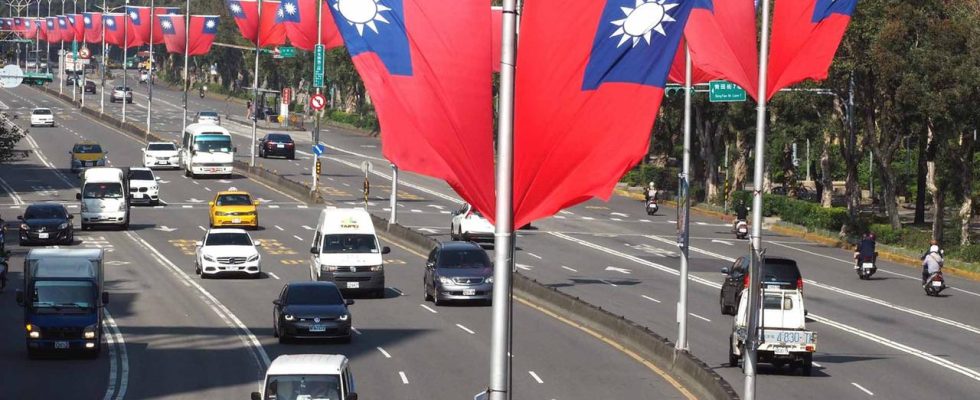Taiwan’s national holiday is marked by increasing tensions over the future of the island. The People’s Republic of China wants to prevent Taiwan’s independence, and the parties in Taiwan are arguing about how to deal with Beijing.
On October 10, Taiwan traditionally celebrates the start of the Wuchang Uprising in 1911, which led to the overthrow of the Chinese Empire and the establishment of the Republic of China. To this day, the government in Taipei sees itself as the legitimate representative of this first Chinese republic, whose political leadership fled to Formosa in 1949 after years of civil war from Mao Zedong’s victorious communists.
The now democratically governed island is now known as Taiwan, but is viewed by the autocratically governed People’s Republic of China as Chinese territory that is not entitled to any independence.
This year, celebrations in Taiwan have led to domestic political polarization between President Tsai Ing-wen’s ruling Democratic Progressive Party (DPP) and the Kuomintang, which has been in opposition since 2016.
President Tsai renamed the national holiday “Taiwan National Day” two years ago. The Kuomintang sees this as a provocation by the People’s Republic of China and fears a further deterioration in relations.
Two different Goals
While the progressive DPP wants to push Taiwan’s independence from China more strongly, the Kuomintang advocates a cooperative agreement with its overpowering neighbor and sees the danger that the proclamation of a Taiwan National Day could endanger the security of the island state.
Former President Ma Ying-jeou, one of the Kuomintang’s most prominent politicians, has even canceled his participation in this year’s celebrations. Ma said the renaming of the national holiday was a violation of the constitution, which enshrines the Republic of China as the country’s name.
presidential election casts shadows ahead
The beginning of the election campaign is likely to play a role in this. Presidential elections are scheduled for January and the Kuomintang wants to return to power in Taiwan.
Good relations with the People’s Republic of China are the only guarantee of peace, said former deputy general secretary of the Kuomintang, Zhang Ronggong, recently at the so-called Cross-Straits Forum, a conference on bilateral relations between China and Taiwan.
The 1992 agreement is the basis for this, says Zhang – and not the declaration of Taiwan’s independence.
The difficulties overcome – but how?
Some Kuomintang politicians go one step further and even talk about unification with the People’s Republic of China. Two-way ties across the Taiwan Strait will go through ups and downs, said former Kuomintang leader Hung Hsiu-chu.
There has even been talk recently of the danger of a military conflict: “We have to overcome our difficulties, then peaceful unification is within reach. We are full of hope.”
Different Interpretations
The agreement concluded in 1992 between the People’s Republic of China and the Kuomintang leadership of Taiwan is interpreted differently by both sides. Beijing sees the agreement as a recognition of the so-called One China principle and thus as a confirmation of Taiwan’s membership of the People’s Republic.
In Taipei, on the other hand, the view is that the term “One China” refers to the historical area, but there are two forms of government, the People’s Republic on the mainland and the Republic of China on Taiwan.
What the DPP wants
For the Democratic Progressive Party DPP, which governs Taipei, Taiwan’s independence is the top priority. President Tsai, who is due to step down in January after two terms in office, invokes the constitution and reiterates that her policies support the sovereignty and territorial integrity of the Republic of China.
Vice President William Lai, who is entering the presidential election campaign as the DPP’s most promising candidate, also stands for independence. Taiwan electing its own president is proof that the country is already de facto sovereign, Lai said in a Japanese newspaper interview.
China attacks the DPP
For the government in Beijing, these are provocations by separatists who wanted to create the false impression that there are two Chinese states. According to Chinese Foreign Ministry spokeswoman Mao Ning at a press briefing in Beijing in early September, the Democratic Progressive Party (DPP) in Taiwan is endangering the status quo and peace and security on both sides of the Taiwan Strait.
The People’s Republic of China is using all political and diplomatic means and military threats to prevent any attempt by Taiwan to represent itself as an independent state. China, a permanent member of the UN Security Council, has been preventing Taiwan from becoming a member of the United Nations or one of the numerous UN sub-organizations for decades.
No prospects for UN membership
The United Nations consists of independent states, said the spokesman for the government’s Taiwan Affairs Office in Beijing. However, Taiwan is not an independent country, but rather an integral part of the People’s Republic of China. Taiwan therefore has no right to join the United Nations.
In recent months, the communist leadership in Beijing has increased its military threats against Taiwan. Chinese fighter jets repeatedly penetrate the security-relevant outskirts of the airspace claimed by Taiwan, and on the Chinese mainland, in the Fujian province opposite Taiwan, air force bases are apparently being expanded and strengthened. State and party leader Xi Jinping has repeatedly reiterated China’s claim to Taiwan and has not ruled out military means for what Beijing calls “reunification.”
The national holiday in Taiwan this year is, on the one hand, in the area of tension between the election campaign and its domestic political differences over how to deal with China. And on the other hand, in the context of the danger of a possible escalation of the military threat posed by the overpowering People’s Republic and its People’s Liberation Army, which is equipped with nuclear weapons.

